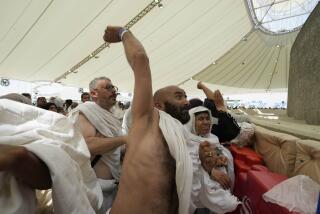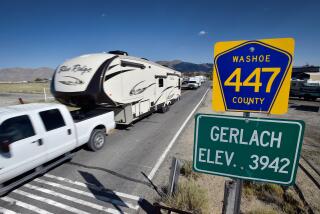Iraq Bans Vehicles During Shiite Event
- Share via
BAGHDAD — The Iraqi government on Friday imposed a two-day vehicle ban in the capital in an effort to avert bloodshed during a major Shiite festival this weekend.
During the festival last year, pilgrims crossing a bridge over the Tigris River stampeded after rumors spread that a suicide bomber was among them. About 1,000 people, many of them women and children, drowned or were trampled to death in what remains the bloodiest day since the U.S.-led invasion of Iraq in 2003.
This year, authorities estimate that more than 1 million people may attend the festival, which marks the death in 799 of Imam Musa al Kadhim, one of 12 major saints in Shiite Islam.
As pilgrims arrived, they found the capital locked down with ubiquitous checkpoints, concrete blast walls separating neighborhoods and thousands of troops patrolling the streets. The vehicle ban, which covers most of Baghdad, will be in effect until 6 a.m. Monday.
While pilgrims made their way toward the blue-domed shrine in eastern Baghdad where Kadhim is buried, violence continued in and around the capital.
Authorities said gunmen shot and killed seven pilgrims walking along a highway in western Baghdad.
North of Baghdad near Baqubah, a Sunni Arab couple was killed by gunmen. In Dora, one of the most lawless areas of the city, a suicide car bomber detonated explosives near a house of worship, injuring three people.
Meanwhile, the U.S. military announced that the Iraqi army had captured three men suspected of ambushing Iraqis last month at a checkpoint in the Jihad neighborhood.
During the last 12 months, U.S. troops have handed over swaths of the capital to Iraqi forces. In most neighborhoods, security deteriorated rapidly.
To regain control of the capital, the U.S. military recently announced a security plan under which its troops would once again become a more active presence there. The stepped-up security effort, involves 13,000 American troops.
In an office affiliated with radical Shiite cleric and militia leader Muqtada Sadr in western Baghdad, soldiers from the 172nd Stryker Brigade found mortars and three surface-to-air 57-millimeter rockets, one rigged as a roadside bomb, according to the military.
U.S. officers suspect that Sadr’s Al Mahdi militia is behind many kidnappings and killings of Sunnis as well as attacks against Americans.
Some militia members have infiltrated the Iraqi army and police forces, making it easier for them to raid homes and move during curfew.
But Shiite leaders have protested U.S. efforts to curb the Sadr militia. “Instead of sending [Iraqi and American] troops to hot spots in Iraq, the government sends them ... to peaceful places like Sadr City and Shula where innocent and virtuous people are arrested and houses are raided,” said Abdul Mohammedawi during prayers outside a Sadr political office in the Sadr City neighborhood.
Mohammedawi also praised “the Islamic resistance in Lebanon, led by the Hezbollah of Hassan Nasrallah” as worshipers chanted praise of Nasrallah and Sadr.
Most of the U.S.-led security operation has targeted Sunni neighborhoods in western Baghdad. Frustrated American commanders say Sadr and his followers have become “untouchable.”
At a Sunni mosque in Baghdad, Khaled Hassnawi told his listeners that violence had become indiscriminate.
“The killings are everywhere in Iraq: yesterday in Haditha and today in Karbala,” he told listeners at the Abdul Qadir Gilani Mosque, referring to a Sunni city to the west and a Shiite city to the south.
*
Times staff writers Saif Hameed and Saif Rasheed contributed to this report.
More to Read
Sign up for Essential California
The most important California stories and recommendations in your inbox every morning.
You may occasionally receive promotional content from the Los Angeles Times.













